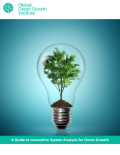
China’s drive to develop a low-carbon, resource-efficient economy is a top priority of the government, placing pressure on the industrial development zones (IDZs) to respond to a growing and diverse set of policy levers. The International Institute for Sustainable Development (IISD), with the support of the Swiss State Secretariat for Economic Affairs (SECO) and the Chinese Ministry of Commerce (MOFCOM), is working with Chinese industrial and economics zones to identify key policy trends that will affect competitiveness and to provide insight to help better manage the transition to a low-carbon, resource-efficient economy. This synthesis report provides an overview of the two phases of the project, which a specific focus on the low-carbon drivers of IDZs, an overview of the research results, policy trends and drivers of low-carbon development in IDZs and Priority areas for action.
This paper presents novel empirical evidence on the internationalization of green R&D by multinational firms (MNCs), as measured by patents data. Using data on inventors’ addresses for the set of 1200 MNCs firms patenting in green technologies over the 2004–2009 period, it was found that about 17% of green patents result from MNCs R&D investments conducted outside their home countries. MNCs tend to locate their foreign green R&D activities in other OECD markets and in China, in particular in lightings and solar technologies. The empirical analysis reveals that the probability of conducting green R&D abroad increases with the host country’s stringency of environmental regulation, market size and (green) R&D intensity. Also, relatively lower wages for scientists and engineers, and stronger protection for intellectual property rights in the host country increase the likelihood for MNCs to offshore green R&D. The paper concludes by discussing the policy implications of this changing global innovation landscape.
China’s transition to a green economy has immense implications for sustainable development both domestically and worldwide. Yet China’s green economy policies, concepts and actors still remain poorly understood in the emerging international discourse on the green economy. This report serves as an introductory guide to China’s green economy thinking by i) tracing the evolution of China’s green economy thinking of the last 40 years (1970s – 2010s), ii) mapping key macro policies that shape China’s green economy prospects today, iii) identifying relevant sectoral policies and players in finance, environmental industry, energy, forestry, urbanisation and industrial production, and iv) examining stakeholder groups, unique traits and areas for further exploration.
This research focuses on identifying the main policy strategies that could potentially contribute to the advance of three Latin American economies, namely Brazil, Chile and Mexico towards a green growth model that is social and inclusive, given the actual patterns of development of those economies. With this aim, firstly the past and current policies in each country in terms of economic, social and environmental indicators is identified and described. A detailed analysis follows for Brazil, Chile and Mexico, in which the authors propose a series of green growth indicators and choose a definition and classification of green growth sectors. There is also the estimation of an empirical model to explain the determinants of green house gas emissions and deforestation in Latin American countries. This paper broadly identifies the sectors that contribute to its increase and describe the main green policies applied in each country. In turn there is identification of the sectors with higher potential for the future. Finally, policy recommendations and reflections for the future is presented.
